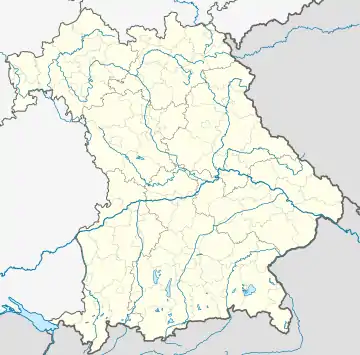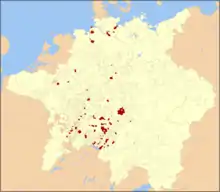Bad Windsheim | |
|---|---|
 Market square of Bad Windsheim | |
 Coat of arms | |
Location of Bad Windsheim within Neustadt a.d.Aisch-Bad Windsheim district  | |
 Bad Windsheim  Bad Windsheim | |
| Coordinates: 49°30′N 10°25′E / 49.500°N 10.417°E | |
| Country | Germany |
| State | Bavaria |
| District | Neustadt a.d.Aisch-Bad Windsheim |
| Subdivisions | 14 Ortsteile |
| Government | |
| • Mayor (2020–26) | Jürgen Heckel[1] |
| Area | |
| • Total | 78.26 km2 (30.22 sq mi) |
| Elevation | 321 m (1,053 ft) |
| Population (2022-12-31)[2] | |
| • Total | 12,643 |
| • Density | 160/km2 (420/sq mi) |
| Time zone | UTC+01:00 (CET) |
| • Summer (DST) | UTC+02:00 (CEST) |
| Postal codes | 91438 |
| Dialling codes | 09841 |
| Vehicle registration | NEA, SEF, UFF |
| Website | www.bad-windsheim.de |
Bad Windsheim (East Franconian: Winsa) is a small historic town in Bavaria, Germany with a population of almost 12,000. It lies in the district Neustadt an der Aisch-Bad Windsheim, west of Nuremberg. In the Holy Roman Empire, Windsheim held the rank of Imperial City (until 1802). Since 1810 Windsheim is part of Bavaria. In 1961, it became a spa town and has since been called "Bad Windsheim".
Climate
The climate in this area shows only small differences between highs and lows, and there is adequate rainfall year-round. The Köppen Climate Classification subtype for this climate is "Cfb" (Marine West Coast Climate/Oceanic climate).[3]
History
A document from 741 proves for the first time the existence of the town, then called Uuinidesheim. The name changed to "Windsheim" by linguistic development, meaning "the home of the wind".
In the late stage of World War II, a Volkssturm battalion took control of the town and refused to surrender to the approaching American troops, declaring Windsheim a "fortress". Demonstrations led by a number of women demanding the local Nazi representative in the town to uphold orders for the destruction of Bad Windsheim ahead of the Allied approach (early April 1945). American troops eventually captured the town after deploying fire bombs through aerial bombing. The civilian population was forced to flee from Windsheim under enemy fire. The town was rebuilt after the war.
Attractions
The town is known for its waters and spa, Franken-Therme, and an open-air museum, the Freilandmuseum, which brings together old farms and farmhouses from the area. On the first weekend in August every year Bad Windsheim is the location for an event called Weinturm Open Air, a concert on the top of a hill in the town. The town also features a war memorial in the form of a large statue of Roland.
Imperial City of Windsheim Reichsstadt Windsheim | |||||||||
|---|---|---|---|---|---|---|---|---|---|
| 1248–1802 | |||||||||
| Status | Free Imperial City of the Holy Roman Empire | ||||||||
| Capital | Windsheim | ||||||||
| Government | Republic | ||||||||
| Historical era | Middle Ages | ||||||||
• City founded | before 741 | ||||||||
• Gained Reichsfreiheit | 1248 | ||||||||
• Political alliance with Nuremberg | 1344 | ||||||||
| 1802 | |||||||||
• Renamed Bad Windsheim | 1961 | ||||||||
| |||||||||
Notable people
Sons and daughters of the town
- Georg Wilhelm Steller (1709–1746), physician and scientist who participated in the Great Northern Expedition
- Johann Christoph Döderlein (1745–1792), theologian
- Otto Strasser (1897–1974), politician, brother of Gregor Strasser
- Erich Mühe (1938–2005), surgeon, founder of micro-invasive surgery in 1985
- Nevio Passaro (born 1980), German-Italian singer and songwriter
- Vyncint Smith (born 1996), American Football Wide Receiver in the National Football League (NFL)
Personalities who worked locally
- Francis Daniel Pastorius (1651–1719), German lawyer and writers, he is considered to be the founder of the first German settlement in North America.
References
- ↑ Liste der ersten Bürgermeister/Oberbürgermeister in kreisangehörigen Gemeinden, Bayerisches Landesamt für Statistik, 15 July 2021.
- ↑ Genesis Online-Datenbank des Bayerischen Landesamtes für Statistik Tabelle 12411-003r Fortschreibung des Bevölkerungsstandes: Gemeinden, Stichtag (Einwohnerzahlen auf Grundlage des Zensus 2011)
- ↑ Climate Summary for Bad Windsheim (from Weatherbase.com)
External links
- Bad Windsheim official website (in German)
- Weinturm Open Air official website (in German)
- Fränkisches Freilandmuseum official website (in German)
- Frankentherme Bad Windsheim official website (in German)

